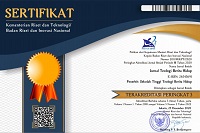Dampak Konteks Politik Masa Intertestamental pada Penolakan Yesus Sebagai Mesias
DOI:
https://doi.org/10.38189/jan.v3i1.312Keywords:
Masa Intertestamental, Penolakan Yesus Sebagai MesiasAbstract
If we want to understand the New Testament more deeply and broadly, it is not enough to interpret it from the text we read, but it is very important to understand the context behind the text. Because the New Testament is full of political, social, cultural, economic, geographical, biographical contexts, which are very different from our present context. It is highly recommended to study Intertestamental Theology, because the New Testament text is very closely related to the context of the Intertestamental period, indeed we cannot build theology from the Intertestamental period, but this period provides an important source of information for New Testament theology. For example, the theological questions that arise when we read the New Testament, are: Why did the Jews reject Jesus as the Messiah?, Why did the Sanhendrin reject Jesus? Even though they consist of groups of different sects and often clash, in terms of rejecting Jesus as the Messiah, they seem to be united in rejecting and agreeing to the decision of the Roman court to put Jesus to death. Of course the political context of the Intertestamental period will provide an answer. In relation to this question, it is important to discuss the topic: "The Political Context of the Intertestamental Period Has an Impact on the Rejection of Jesus as the Messiah". An exploration of the political context of the Intertestamental period will highlight the rulers who ruled in the period between the Old and New Testaments which is about 400 years apart. What was the political condition of the Jewish nation at that time? The political, religious and social atmosphere at that time changed significantly. As a colonized nation, they certainly experienced oppression, not being free to carry out their religious rituals. In such conditions, they hoped for the presence of a Messiah who would free them from colonialism. The time came for the fulfillment of the prophecies of the prophets about the expected Messiah, namely Jesus the Nazarene, but they rejected Him because it did not match their political expectations.
Bila kita ingin memahami Perjanjian Baru lebih dalam dan luas, maka tidak cukup menafsirkannya dari teks yang kita baca, tetapi sangat penting memahami konteks yang melatarbelakangi teks tersebut. Sebab Perjanjian Baru sarat dengan konteks politik, sosial, budaya, ekonomi, geografis, biografi, yang berbeda jauh dengan konteks kita masa kini. Sangat disarankan untuk belajar Teologi Intertestamental, karena teks Perjanjian Baru sangat berkaitan erat dengan konteks periode Intertestamental, memang kita tidak mungkin membangun teologi dari masa Intertestamental, akan tetapi periode tersebut memberikan sumber informasi yang penting untuk teologi Perjanjian Baru. Misalnya, pertanyaan teologis yang muncul ketika kita membaca Perjanjian Baru, ialah: Mengapa bangsa Yahudi menolak Yesus sebagai Mesias?, Mengapa Sanhendrin menolak Yesus? Sekalipun mereka terdiri dari kelompok yang berbeda aliran dan sering bentrok, akan tetapi dalam hal menolak Yesus sebagai Mesias mereka nampaknya kompak bersatu menolak dan menyetujui keputusan pengadilan Romawi untuk menghukum mati Yesus. Tentunya konteks politik masa Intertestamental akan memberikan jawaban. Terkait dengan pertanyaan tersebut, maka penting artinya untuk membahas topik: “Konteks Politik Masa Intertestamental Berdampak Pada Penolakan Yesus Sebagai Mesiasâ€. Penelusuran tentang konteks politik masa Intertestamental akan menyoroti para penguasa yang memerintah pada masa antara Perjanjian Lama dan Perjanjian Baru yang terpaut waktu sekitar 400 tahun. Bagaimana kondisi politik bangsa Yahudi pada masa itu? Suasana politik, agama dan sosial pada masa itu berubah secara signifikan. Sebagai bangsa yang terjajah, mereka tentunya mengalami penindasan, tidak bebas menjalankan ritual agamanya. Dalam kondisi seperti itu, mereka mengharapkan hadirnya seorang Mesias yang akan membebaskan mereka dari penjajahan. Tiba waktunya penggenapan nubuatan para nabi tentang Mesias yang dinantikan, yaitu Yesus Orang Nasaret, tetapi mereka menolak-Nya karena tidak sesuai dengan harapan politis mereka.
References
Boice, James Montgomery, Dasar-Dasar Iman Kristen. Surabaya: Momentum, 2005
Drane, John, Memahami Perjanjian Baru; Pengantar Historis – Teologis. Jakarta: BPK Gunung Mulia, 2000
Free, P. Joseph dan Howard F Vos, Arkeologi dan Sejarah Alkitab. Malang: Gandum Mas, 1997
France, Richard, Latar Belakang Keagamaan dalam Perjanjian Baru, Dalam: Handbook to the Bible, Pedoman Lengkap Pendalaman Alkitab. Bandung: Kalam Hidup, 2004
Halley, H. Henry, Penuntun Ke Dalam Perjanjian Baru. Surabaya: Yakin. 1979
Hemer, Colin, Latar Belakang Sejarah dan Politik dari Perjanjian Baru: Handbook to the Bible, Pedoman lengkap Pendalaman Alkitab. Bandung: Kalam Hidup, 2004
McDowell, Josh, Apologetika; Bukti yang meneguhkan kebenaran Alkitab. Malang: Gandum Mas, 2002
Packer, J.I dkk., Ensiklopedi Fakta Alkitab; Bible Almanac-1. Malang: Gandum Mas
Kamus Besar Bahasa Indonesia. Jakarta: Balai Pustaka, 1988
Downloads
Published
How to Cite
Issue
Section
License
Angelion is licensed under a Creative Commons Attribution-ShareAlike 4.0 International License.
Based on a work at https://e-journal.iaidalwa.ac.id/index.php/jan
E-mail: [email protected]

















